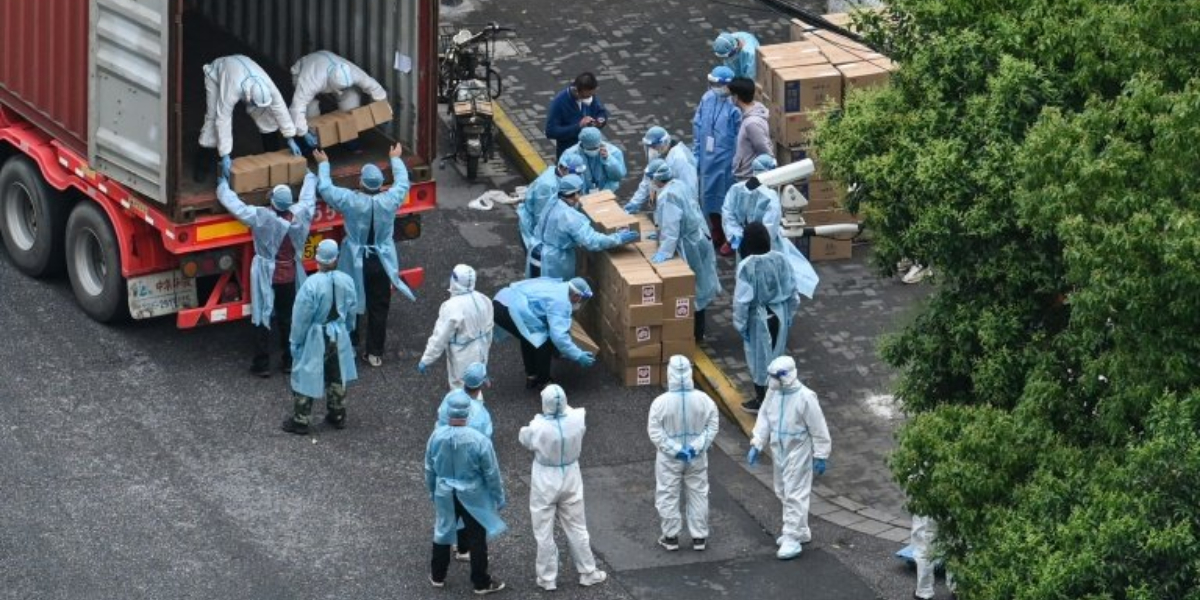Disinfectant spraying is one of the viral controls in its arsenal, which a top Shanghai official praised earlier this month as a critical element of a “grand assault” on the virus.
China’s hazmat-clad health workers are cleaning houses, roads, packages, and even individuals, leaving a thin mist of disinfectant in their trail — but experts believe it’s a fruitless strategy against Covid-19 after more than two years.
China has adopted a zero-Covid approach, including emergency lockdowns, mass testing, and extended quarantines as part of an unwavering drive to contain viral epidemics at whatever cost to the economy or citizens’ liberties.
Disinfectant spraying is one of the viral controls in its arsenal, which a top Shanghai official praised earlier this month as a critical element of a “grand assault” on the virus.
Footage shows legions of “big whites,” as hazmat-suited health workers are known in China, showering buildings with a virus-killing haze after their occupants had been placed in state quarantine.
The scene has become one of the most visible manifestations of China’s zero-Covid policy, which has taken on political significance as President Xi Jinping has staked his leadership legitimacy on the protection of Chinese lives from Covid.
The photographs depict personal belongings and house furnishings in clouds of cleaner, while city streets, fences, and parks are the targets in other situations.
Experts told AFP that such labor-intensive programmes are ineffective against a virus that spreads by droplets produced in coughs and sneezes into the air.
“Because illness via touching contaminated surfaces is not a common mode of transmission, widespread and forceful disinfectant usage is unnecessary,” said Yanzhong Huang, a senior fellow at the Council on Foreign Relations in New York.
Transmission via contaminated surfaces and objects is feasible, but uncommon.
China’s disinfection sprayers have defied the odds.
Vice-mayor Liu Duo reported that as of May 2, Shanghai has sterilised 13,000 sites under a programme aimed at sick people’s residences, apartment blocks, and “preventative” cleaning of entire complexes.
For weeks, the city has been engulfed in a shifting patchwork of lockdowns, with some of its 25 million citizens squabbling with police and venting their rage and anger on social media.
A hazmat-suited health worker with a strong hose sprays clouds of disinfectant on a resident’s bed, desk, and clothing in one social media video authenticated by AFP.
Other footage shows employees strewn around streets and apartment complexes, spritzing walls, scooters, and even the ground while inhabitants queue for testing.
After returning from quarantine, one Shanghai resident told AFP that his home was sterilised twice, with his family being forced to wait outside for an hour each time.
Experts questioned whether the step was necessary for safeguarding public health.
While the virus may spread through surfaces, “it cannot survive long outside the human body, thus sterilising external surfaces is unnecessary,” according to Huang of the Council on Foreign Relations.
“The extensive use of various chemical disinfectants, such as chlorine disinfectant, may have negative health (and) environmental consequences.”
Outdoor disinfection, according to Leong Hoe Nam, an infectious disease doctor at Singapore’s Mount Elizabeth Novena Hospital, is “completely worthless.”
He told AFP, “The Chinese expression is ‘drawing feet on a serpent’ — unnecessary.”
“One might see a reason for utilising every feasible way to prevent transmission,” he told AFP, given the disruptive impact of unexpected lockdowns.
These might include “near-zero impact” tactics that “could in rare situations prevent one infection,” he noted.
The disinfection drive, according to Leong, was mostly “a lot of visible intervention that pleases administrators” rather than doing much to stop Covid from spreading.
However, Huang believes that Beijing’s desire to demonstrate its commitment to a flagship policy was the more important factor.
He described the action as “conjuring up the notion of a heroic combat against an unseen opponent.”

















